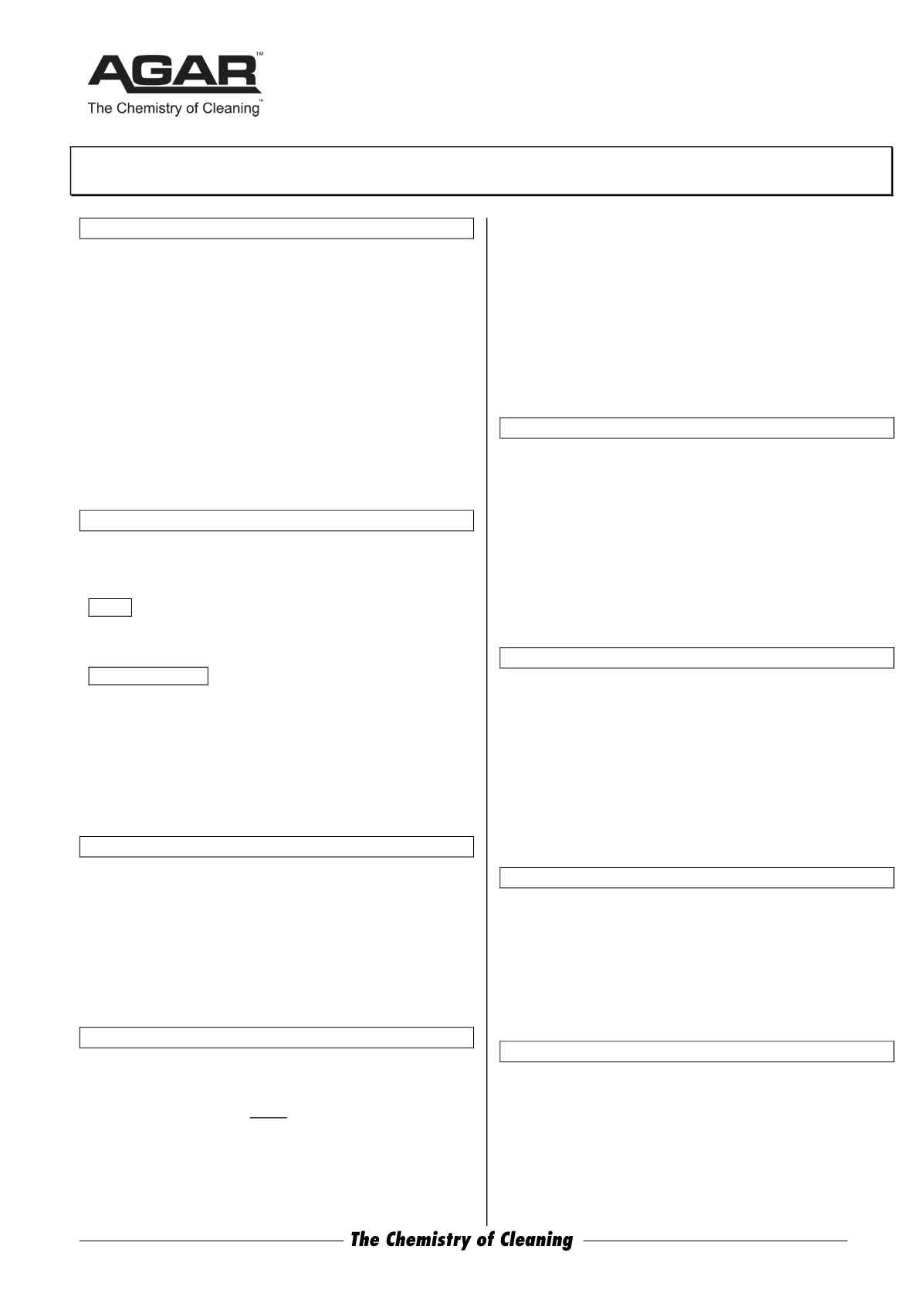

ABN 80 004 726 890 | MADE IN AUSTRALIA
VIC 03 9480 3000
NSW 02 9743 6020
SA 08 8293 2020
QLD 07 3274 3438
WA 08 9249 4566
Safety Data Sheet
Issued: March 8, 2016
Page 1 of 2
LCD-11 DETERGENT
1 IDENTIFICATION OF THE MATERIAL AND SUPPLIER
Product Name:
LCD-11 DETERGENT
Other Names: Caustic Alkali Liquid, N.O.S
Manufacturer's Product Code: LCD1120
Product Use: Alkaline CIP detergent for cleaning pipelines and
tanks in food-processing facilities.
COMPANY DETAILS
Company: Agar Cleaning Systems Pty. Ltd.
Address: 12-14 Cope Street, Preston, Vic. 3072
Telephone: 03 9480 3000 Facsimile: 03 9480 5100
Web:
www.agar.com.auAgar SDS are available from this website.
E-mail:
admin@agar.com.auEmergency Telephone Number: 131 126
(Aust wide)
2 HAZARDS IDENTIFICATION
Hazardous according to criteria of Safe Work Australia.
Corrosive C, Harmful Xn. Classed as Dangerous Goods.
Risks:
Causes severe burns. [R35]
Harmful if swallowed. [R22]
Safety Directions:
Keep out of the reach of children. [S2]
In case of contact with eyes, rinse immediately
with plenty of water and seek medical advice. [S26]
Wear suitable protective clothing, gloves and eye/face
protection. [S36/37/39]
In case of accident or if you feel unwell, seek
medical advice immediately (show the label
whenever possible). [S45]
3 COMPOSITION / INFORMATION ON INGREDIENTS
Ingredients:
Chemical Entity: CAS No.: Proportion:
Sodium hydroxide
1310-73-2
30 - < 60%
Sodium metasilicate 6834-92-0 < 10%
Tetrasodium ethylene diamine
tetra-acetate
64-02-8 < 10%
Surfactants
-
< 10%
Water and
7732-18-5
other non-hazardous ingredients
to 100%
4 FIRST AID MEASURES
Poisons Information Centre: Phone 131 126
Swallowed:
If poisoning occurs, contact a doctor or Poisons
Information Centre. Seek urgent medical assistance. If
swallowed, do NOT induce vomiting. Give a glass of water.
Rinse mouth with water. Never give anything by mouth to an
unconscious person. If vomiting occurs give further water to
achieve effective dilution.
Eye:
Immediately hold the eyes open and wash continuously
for at least 15 minutes with fresh running water. Ensure
irrigation under eyelids by occasionally lifting the upper and
lower lids. Removal of contact lenses after an eye injury
should only be undertaken by skilled personnel. Contact a
doctor or Poisons Information Centre.
Skin:
Remove any contaminated clothing and flush area with
water. Seek medical attention in the event of irritation.
Inhaled:
Remove patient to fresh air. Apply resuscitation if
victim is not breathing. DO NOT use direct mouth-to-mouth
method if victim has swallowed or inhaled the substance; use
alternative respiratory method or proper device. Administer
oxygen if breathing is difficult.
Advice to Doctor:
Treat symptomatically and as for strongly
alkaline corrosive materials.
5 FIRE FIGHTING MEASURES
Fire/Explosion Hazard: LCD-11 is not combustible.
Fire Extinguishing Media: Water spray or fog. Foam. Dry
chemical powder. Carbon dioxide.
Fire Fighting PPE: Wear SCBA and chemical splash suit. Fully
encapsulating, gas-tight suits should be worn for maximum
protection. Structural fire-fighters uniform is NOT effective for
this material.
Special fire-fighting procedures: None.
Unusual fire hazards: None.
Hazardous products of combustion: Thermal decomposition in a
large fire may yield toxic fumes.
6 ACCIDENTAL RELEASE MEASURES
Eliminate all ignition sources within 50m. Clean up all spills
immediately. Do not touch or walk through spilled material. Do
not touch damaged containers or spilled material unless wearing
appropriate protective clothing.
Stop leak if safe to do so – prevent entry into waterways, drains
or pits. Cover with DRY earth, sand or non-combustible material
followed by plastic sheet to minimise spreading or contact with
rain. DO NOT get water inside containers.
If spilled on clothing, it should be removed and laundered before
re-use.
7 HANDLING AND STORAGE
Storage and Transport: Store in a cool, dry place. Store away
from acids. Keep containers closed at all times. Keep out of
reach of children.
Incompatibility (Materials to avoid for purposes of transport,
handling and storage only): Not to be loaded with Class 4.3
(dangerous when wet products), Class 5 (oxidising agents) or
foodstuffs.
8 EXPOSURE CONTROLS / PERSONAL PROTECTION
Exposure Standards: None assigned for product.
Atmospheric Contaminant Exposure Standard for:
Sodium hydroxide: CAS No.1310-73-2 = C2.00 mg/cu.m
[Source: Safe Work Australia HSIS 2016)].
Please turn to page 2.


















